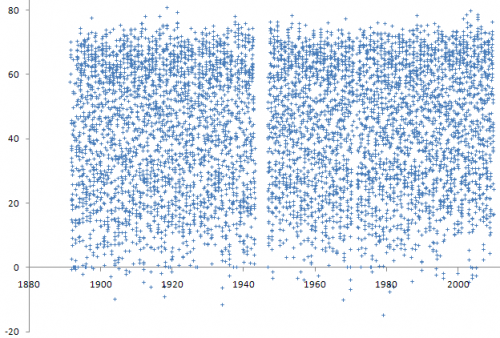A friend (who shall remain nameless to avoid persecution) relates:
I just have to share a somewhat funny, mostly frustrating story. XXX and I went to Montreal to see U2 last night …
So at the end of the show, it started raining. Not a light rain but a sharp, arctic windy rain to the point we were all saturated within minutes. No exaggeration. It took us 2 hours to get out of the stadium, to the Metro, and back to the hotel because there were 80,000 people trying to get out. It was purgatory. It was after 3 am before we finally got to sleep.
OK, that’s not the story either. My point, besides sharing the night with you, is to explain my state of mind leading up to the customs experience. At the border, things were going smoothly … until the security guard asked us what we do for work. When I told him what I do, he retorted, “Global warming is not happening. Have you seen the cold weather we’ve had for the past five years?” Of course, I couldn’t let that just sit there. I explained climate change is not just warmer weather but more extreme events and weather is different from climate. So then we actually started arguing about this and I got all fired up …
Now the frustrating part. As we drove away, though, I just felt so despondent that this is the battle with much of the public that we face. How can we convince people to act and to demand their government to act when they really don’t think there is a problem? I’ve been thinking we should utilize some of our time to reach out to the masses who are not looking to improve their mental models of climate change because they don’t even think such a thing exists. …
The fundamental problem, I think, is that evidence for climate change relies on a variety of measurements dispersed over the globe, and physics and models at a variety of levels of complexity. Yet neither of these is accessible to ordinary people. Therefore, when presented with a mix of inconvenience of reducing emissions, false balance, and pseudoscience, people default to a “trust no one” approach, only believing what they can perceive with their own senses: local weather.
That’s a problem, for several reasons. First, local weather is extremely noisy, and only loosely correlated with global energy balance. So, even a person with unbiased weather perception and perfect recall over a long time period really shouldn’t be drawing any conclusions about global conditions from local measurements.
Second, no one has unbiased perception and perfect recall over long periods. Consider the “cold weather we’ve had for the past five years.” Here’s the temperature from the USHCN Enosburg Falls, VT station, near the border crossing, from 1891 through the end of 2009, in degrees Fahrenheit:

It’s hard to imagine something happening in 2010 and 2011 that could lead one to feel good about conclusively calling a 5-yr cold spell. In fact, almost the only thing you can see here is a slight upward trend.
Continue reading “Boiled frogs, pattern recognition and climate policy”
